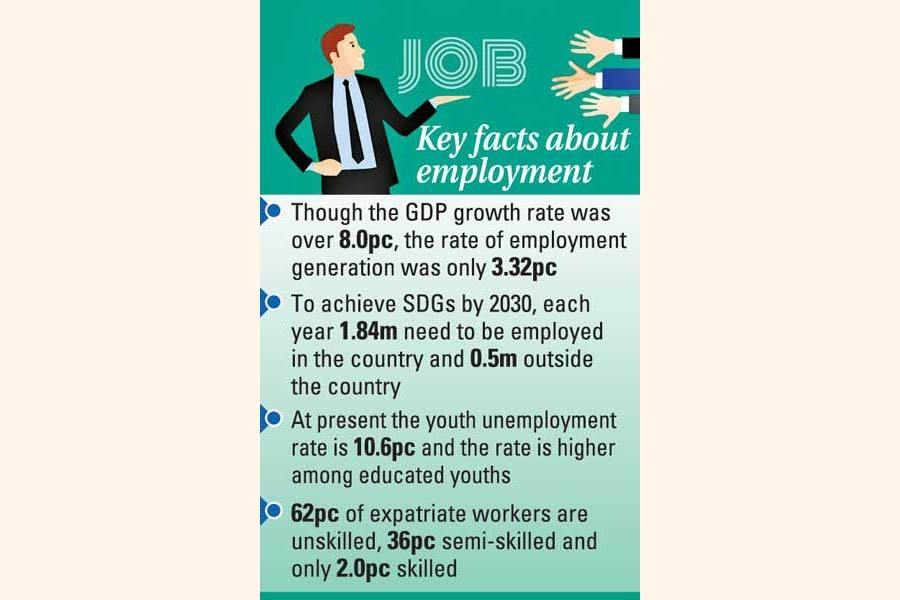
Published :
Updated :

The government has drafted a policy aiming to create about 30 million fresh jobs by 2030, officials say.
The policy, first of its kind, has put emphasis on employment based on subjects and sectors with special focus on youths, they said.
One of the main objectives of the policy is to create a poverty and unemployment-free society,
The Ministry of Labour and Employment has drafted the policy titled the 'National Employment Policy 2020.'
When asked, a labour ministry official said the ministry is working on setting up an Employment Department to generate skilled manpower and provide them with jobs.
The proposed department is expected to prepare a roadmap for overcoming the future challenges and analyse the demands for jobs both at home and abroad, he added.
The department would set up training institutes in divisional headquarters across the country and devise demand-based training modules for the unskilled people, ministry officials said.
They have sought opinions from different corners and put the draft on the ministry's official website for comments.
"We will finalise the draft shortly. The opinions will also be taken into consideration if they are found important," he told the FE on Sunday.
The progress of the work has been slow for the last few months due to COVID-19, officials said, but they expected the normal pace to return soon.
The main purpose of the policy is to encourage self-motivated, discrimination-free, timely, productive and full employment generation, would help foster national development.
The policy will be applicable to all citizens both in the formal and informal sectors.
It will also help identify the possible and new employment spheres with the motto of "no one is left behind."
Though the gross domestic product growth rate was over 8.0 per cent, the rate of employment generation was only 3.32 per cent, the draft read.
Citing research findings, it said, to achieve the SDGs by 2030, each year 1.84 million people need to be employed in the country while another 0.5 million outside the country.
At present, youth unemployment rate is 10.6 per cent and unemployment rate is higher among educated youths.
Though the youth population is large, the country can't properly utilise them, the policy said. On the other hand, 62 per cent of the expatriate workers are unskilled, 36 per cent semi-skilled and only 2.0 per cent are skilled.
The aim of the policy would be to encourage men and women for productive employment according to their desire and to develop a skilled workforce who would be able to face the global competition, the draft said.
According to the draft, more than 85 per cent of the country's total workforce is engaged in the informal sector and the policy would work on ensuring decent work for such labourers.
The government is going to formulate the policy to tap the potentials of demographic dividend as the highest number of people in the country is aged between 15 and 64 years, the draft said.
The policy has also identified a number of challenges that hinder the skilled workforce generation, including the shortage of sector-based modern training facilities and required number of trainers.


 For all latest news, follow The Financial Express Google News channel.
For all latest news, follow The Financial Express Google News channel.